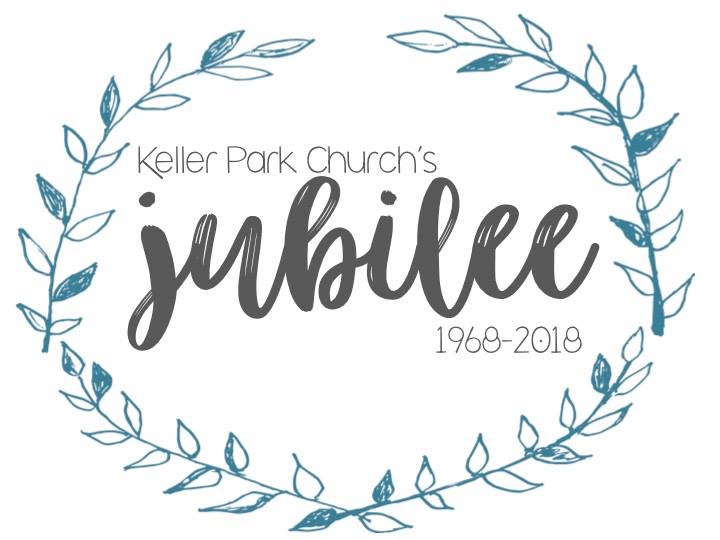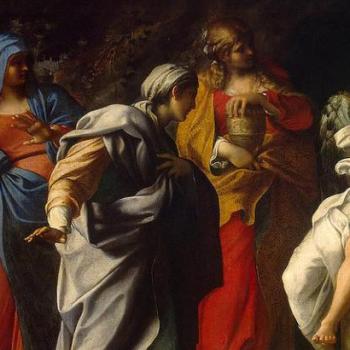Last year the church where I serve as teaching pastor, Keller Park Church (South Bend, Indiana), celebrated its 50th anniversary—or our very own year of Jubilee. To celebrate this occasion, I preached a series on the Jubilee theme as found in the Gospel of Luke (with allusions to Isaiah and Leviticus). Below is the first sermon of the series.

When I was a kid, my brother and I used to spend our summers watching movies on VHS. I think we owned about ten movies total—classics like ET, Jurassic Park, and The Return of Jafar(!)—but we really only needed two. We watched and re-watched the first Indiana Jones movie, Raiders of the Lost Ark, and the basketball highlight film, NBA Superstars 1989.
We watched those two movies so often that eventually the sound and picture started to distort, as only a VHS could. We loved these movies so much that often when we’d finish them, we’d want to immediately watch them all over again.
And so with our gray remote control attached to our big gray VCR with a with a long gray cord, we would press the button with those two gray backward arrows that indicated “rewind.” Then we would take a five minute break as we waited in anticipation for the tape to rewind back to the start.
When Jesus returns to his hometown of Nazareth after being baptized by John in the Jordan River and tempted by the devil in the wilderness, he goes to the synagogue on the Sabbath, takes the scroll of Isaiah that is handed to him, reads a short passage, gives the scroll back, and sits down.
Then when he realizes that everyone is staring at him, he turns around and says, “Oh yeah, by the way, today this scripture is fulfilled in your hearing.”
And the townspeople go crazy.
First they’re amazed by his teaching, and then they’re so angry at him that they try to throw him off a cliff.
What’s going on in this story?
Essentially it’s this: Jesus has pressed rewind, and then dropped the remote.
Jesus has declared himself to be the anointed one, the messiah. And in his first act as messiah, he’s announced “the year of the Lord’s favor,” or the year of Jubilee.
By declaring himself the messiah and announcing the year of Jubilee, Jesus has outed himself as a revolutionary.
We normally think of a revolutionary as someone who brings about dramatic change by declaring something new.
But the root of the word revolution is revolve, which comes from the Latin word revolvere—meaning “roll back.” Jesus brings about something new by calling the people back to something old.
He starts the movie over by pressing rewind.
But what exactly is this year of the Lord’s favor, this year of Jubilee, that Jesus announces? In order to find out, we too need to rewind the movie a bit.
We can start by rewinding to the Old Testament passage that Jesus reads from in Nazareth: Isaiah 61.
Isaiah 61 is written by a prophet to the Jews who are returning to Jerusalem after being exiled in Babylon for 70 years.
To this beleaguered, ragtag group, Isaiah offers a message of renewal:
The Spirit of the Sovereign Lord is on me,
because the Lord has anointed me
to proclaim good news to the poor.
He has sent me to bind up the brokenhearted,
to proclaim freedom for the captives
and release from darkness for the prisoners,
to proclaim the year of the Lord’s favorand the day of vengeance of our God,
to comfort all who mourn,
and provide for those who grieve in Zion—
to bestow on them a crown of beauty
instead of ashes,
the oil of joy
instead of mourning,
and a garment of praise
instead of a spirit of despair.
They will be called oaks of righteousness,
a planting of the Lord
for the display of his splendor. (61:1–3 NIV)
Isaiah is telling this group of exiles:
Blessed are you who are poor, for the year of the Lord’s favor is here, and yours is the kingdom.
Blessed are you who are brokenhearted, for the year of the Lord’s favor is here, and you will laugh.
Blessed are you who are captive, for the year of the Lord’s favor is here, and you shall be set free.
Blessed are you who are imprisoned, for the year of the Lord’s favor is here, and you shall be released.
Blessed are you who mourn, for the year of the Lord’s favor is here, and you shall be comforted.
Blessed are you who hunger and thirst for righteousness, for the day of the God’s vengeance is here, and you shall be vindicated.
We often think of the prophets as people foretell the future. But Isaiah, as with most of the Hebrew prophets, speaks of the future by connecting it to the past.
And so Isaiah continues in verse 4:
They will rebuild the ancient ruins
and restore the places long devastated;
they will renew the ruined cities
that have been devastated for generations.
Notice the number of words that begin with the “re-” prefix: “rebuild,” “restore,” “renew.” The “re-” prefix gives words the meaning of “once more,” “afresh,” “anew.” There’s a newness that comes from a return to a previous state.
As Isaiah is promising the Jewish exiles a new beginning, it’s a beginning that’s rooted in their past.
Isaiah, like Jesus, is a revolutionary.
To see what Isaiah is calling the Jewish people back to, we need to rewind the movie even further. From the Old Testament prophets we rewind all the way back to the Book of Moses, or Pentateuch, and specifically to the book of Leviticus, chapter 25.
Leviticus is a book full of laws that YHWH, or God, told to Moses on Mount Sinai, while the Israelites were in the desert after being delivered from slavery in Egypt.
And so, in 25:1–13, we read:
The Lord said to Moses at Mount Sinai, “Speak to the Israelites and say to them: ‘When you enter the land I am going to give you, the land itself must observe a sabbath to the Lord. For six years sow your fields, and for six years prune your vineyards and gather their crops. But in the seventh year the land is to have a year of sabbath rest, a sabbath to the Lord. Do not sow your fields or prune your vineyards. Do not reap what grows of itself or harvest the grapes of your untended vines. The land is to have a year of rest. Whatever the land yields during the sabbath year will be food for you—for yourself, your male and female servants, and the hired worker and temporary resident who live among you, as well as for your livestock and the wild animals in your land. Whatever the land produces may be eaten.
“‘Count off seven sabbath years—seven times seven years—so that the seven sabbath years amount to a period of forty-nine years. Then have the trumpet sounded everywhere on the tenth day of the seventh month; on the Day of Atonement sound the trumpet throughout your land. Consecrate the fiftieth year and proclaim liberty throughout the land to all its inhabitants. It shall be a jubilee for you; each of you is to return to your family property and to your own clan. The fiftieth year shall be a jubilee for you; do not sow and do not reap what grows of itself or harvest the untended vines. For it is a jubilee and is to be holy for you; eat only what is taken directly from the fields.’”
God is setting a pattern for the Israelites for when they enter the Promised Land. They are to work the land for six years, and then take one year off. And then, after seven cycles of six years on and one year off, they are to take the fiftieth year—the year of the Lord’s favor, or the year of Jubilee—to rewind the movie.
The rest of chapter 25 describes what all this year of Jubilee entails. The Jubilee is a year when land is redistributed, debts are remitted, slaves are redeemed, prisoners are released. It’s a year when all things are reset, restored, renewed, recovered, reestablished, reconciled. It’s a year of remembrance, rest, restitution, repentance, and rejoicing.
And, as far as we can tell from Scripture, it’s a year that was never celebrated in Israel history.
This is why the prophets—Isaiah, Ezekiel, Jeremiah—are considered so subversive and revolutionary when they call Israel back to this ancient practice. And this is why, when Jesus begins his public ministry by reading from Isaiah and proclaiming the fulfillment of the year of Jubilee in their midst, the people of Nazareth are both astonished and indignant.
The Jubilee is good news to the poor, the captive, the prisoner, the landless, the one crushed by debt.
But it might not be such good news to the wealthy, the slave-owner, the landowner, the powerful.
They would just as soon throw this messiah off a cliff than allow him to go around proclaiming the year of Jubilee.
But Jesus slips through the crowd and heads on his way to continue spreading the Jubilee revolution throughout Galilee, and then throughout Judea and Samaria, and, ultimately, to the ends of the earth.












